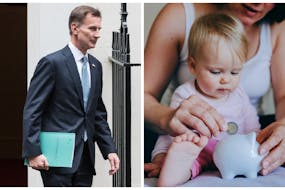Chancellor Jeremy Hunt is said to be considering a freeze on the threshold for claiming this benefit.
Bad news for families – as hundreds of thousands of Brits could lose their child benefit payments if a new government decision to freeze the threshold comes into force.
As part of Thursday's budget , Chancellor of the Exchequer Jeremy Hunt could set out plans to freeze the threshold at which parents can claim child benefit – for another six years.
This decision will see up to 700,000 families losing out on part or all of their child benefit payments and will affect a third of UK parents by 2028, new research has found.
The threshold at which families can claim full child benefit is currently set at £50,000. It hasn't been increased since it was first introduced in 2013.
As wages naturally increase within the next six years, this is likely to push hundreds of thousands of families over the £50,000 threshold, meaning they'll lose out on this benefit – unless the threshold is increased.
Currently, any households where one partner earns £50,000 or more starts to lose part of their child benefit payments, as they have to pay a high income child benefit charge – a tax on the benefit they receive.
Any households where one partner earns £60,000 or above loses the right to claim child benefit payments altogether.
The Institute for Fiscal Studies (IFS), who conducted research on the figures, said:
'The high-income child benefit tax charge, introduced in January 2013, means that child benefit is tapered away for families whose highest-income partner has an annual income above £50,000.
'For every £100 of that individual’s income above £50,000, child benefit entitlement falls by 1%.
'This means that if the higher-income partner’s income is below £60,000, then the family is eligible for a partial payment, whereas if income is at or above this amount, the family is not eligible for child benefit.'
The IFS added:
'These thresholds are frozen in nominal terms, meaning that every year more families lose eligibility for some or all of their child benefit.'
While this decision will likely affect around 2.7 million families by 2028, this is a huge hike from the 2 million families currently affected by the policy.
The decision to freeze the child benefit threshold comes as part of a wider plan that's likely to see families paying more tax.
The Autumn Statement is due to be announced on 17 November at 11:30am by Chancellor Jeremy Hunt.
He has already warned he would be a 'Scrooge' and 'making horrible decisions,' as Brits are 'all going to be paying a bit more tax' and 'everyone' would be asked to make 'sacrifices.'
It's thought that the Chancellor will freeze National Insurance and Income Tax thresholds for another two years, up to April 2028.
It's also been reported that families could see another increase in their energy bills, with the current £2,500 energy bill cap set to increase to between £2,850 and £3,100.
This would lead to a £600 per year increase in current bills for families, plus an increase of almost £2,000 per year since the middle of 2021.
What is child benefit?
Child Benefit is a payment that you can claim if you’re responsible for a child under the age of 16 (or under 20 if they're in full-time education or training).
You can claim as soon as your child's birth is registered. It's best to apply before they're 12 weeks old. This is because payments can only be backdated by three months, so you don't want to miss out.
While it's usually tax-free, if you or your partner earns over £50,000 a year, you may have to pay a tax charge on what you get.
How much child benefit should I receive?
From April 2022, the child benefit rates are as follows:
- £21.80 per week for your first child
- £14.45 per week, per child for any further children
If your family is split, with one child living with you and another with another person, you can both claim the full £21.80. If either of you have any other children, you'll get £14.45 for each additional child.
If your family is combined, with children from both partners living under one roof, the eldest child will qualify for £21.80, and any other children for £14.45 each.
Here's exactly how much Child Benefit you'll get from April 2022, depending on how many children you're claiming for:
- One child: £21.80 a week, or £1,113.60 a year
- Two children: £36.25 a week, or £1,885 a year
- Three children: £50.70 a week, or £2,636.40 a year
- Four children: £65.15 a week, or £3,387.80 a year
- Five children: £79.60 a week, or £4,139.20 a year
Related stories
What families can expect in this week's 'eye-watering' budget
Parents will get up to £780 extra in pay cheques from this month








